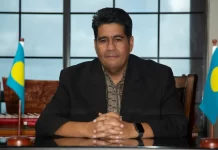Lawmakers from the European Union (EU) and the African, Caribbean and Pacific (ACP) have repeated demands for Hungary to lift its veto on the successor to the Cotonou Agreement which governs economic and political relations between the EU and the 79-country bloc.
“With one EU member state still refusing to accept the new Agreement, we call on the EU Council and the Swedish Council Presidency to not spare any efforts to quickly sign the new agreement,” said the two co-presidents of the ACP-EU Joint Parliamentary Assembly(JPA), Portuguese socialist Carlos Zorrinho and Mozambique lawmaker, Ana Rita Sithole in a joint statement on Friday (03 March).
“The Cotonou Agreement has been extended multiple times. The latest extension will expire at the end of June 2023, leading to a legal gap that would mean that the JPA meetings could no longer take place. Time is running out,” they added.
Although the new treaty was finalised by negotiators in 2021 – itself bringing an end to a lengthy negotiating process – it has still not been ratified. Hungary has been withholding its approval on the grounds that the treaty’s provisions on the repatriation of migrants are too weak.
Negotiators from the EU and African, Caribbean and Pacific signed off on a broad 20-year partnership deal to succeed the Cotonou Agreement on 03 December last year after nearly three years of difficult talks.
There is no sign of Hungary of dropping its veto any time soon, and the delay is an acute source of embarrassment to EU officials who believe that the failure to ratify the treaty is a sign of bad faith.
Hungary has employed similar delaying tactics over the past year to delay the accession of Finland and Sweden to the NATO alliance as well as financial aid to Ukraine in response to the European Commission’s decision to withhold billions of euros in post-COVID recovery funding to Budapest over concerns about rule of law and judicial independence.
The new treaty covers political and economic relations with the 79-member ACP but, unlike its predecessor, does not have an aid component or change EU-African trade relations.
The political implications of the block on the post-Cotonou accord were alluded to by French President Emmanuel Macron following February’s extraordinary EU summit on migration where EU leaders vowed to step up their diplomatic efforts with African states on control and repatriation of irregular migrants.
“You are right to underline the difficulty,” said Macron, adding that “I think that certain frameworks are a bit worn out today and so we must go beyond”.
The latter remark hinted at moving away from the African, Caribbean and Pacific format, whose secretariat is financed by the EU budget and, unlike the African Union, is not regarded as an equal partner to the European Commission.
The decision by South Africa, arguably the most powerful single nation in the ACP, to leave the bloc late last year was another blow to the organisation.
Meanwhile, the European Investment Bank (EIB) and the European Commission has signed agreements for a total volume of €4 billion (US$4.2 billion); consisting of a Guarantee Agreement that will mobilise up to €3.5 billion (US$3.7 billion) in lending and a €500 million (US$534 million) Trust Fund contribution, to support businesses in African, Caribbean and Pacific (ACP) countries until 2027.
The agreement marks an important step in rolling out the EU’s Global Gateway strategy and achieving development impact by enabling the EIB to enhance not only public but also private investments in key areas like digitalisation, climate and energy, transport, health in partner countries.
SOURCE: EURACTIV/PACNEWS













